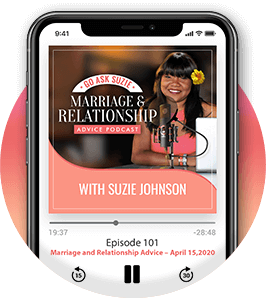![]() After finding out recently that my husband of 25 years has had two long-term sexual relationships, I made a decision to file for divorce, as I can no longer trust nor live with him without trust. I don’t know how to handle my feelings and make sense of what happened. I have been going about my everyday life normally, but I am humiliated and feel like a complete fool. I’ve told no one else about this except my parents. Could you help me understand this and deal with a hurt that has no bottom to it?
After finding out recently that my husband of 25 years has had two long-term sexual relationships, I made a decision to file for divorce, as I can no longer trust nor live with him without trust. I don’t know how to handle my feelings and make sense of what happened. I have been going about my everyday life normally, but I am humiliated and feel like a complete fool. I’ve told no one else about this except my parents. Could you help me understand this and deal with a hurt that has no bottom to it?
![]() Thank you for the opportunity to serve. To help answer your question, here are some tips on healing the hurt and finding your way back to happiness after infidelity:
Thank you for the opportunity to serve. To help answer your question, here are some tips on healing the hurt and finding your way back to happiness after infidelity:
Emotional wounds, like physical wounds, take time to heal.
Even though your “wounds” are invisible, it doesn’t mean they’re not there. You have to give yourself the same compassion, the same gentleness, and the same amount of time to heal, as you would if you had a physical injury. This requires patience and perseverance, and is more of a marathon than a sprint.
Nothing could have prepared you.
Infidelity is a lot like a car crash — by the time you see it coming and slam on the brakes, it’s too late. The impact is sudden and awful to comprehend, and the aftermath and aftershock can last for a long time. It’s important to let yourself pass through all the stages of recovery.
It’s not your fault.
The first thing many women do in a situation like this is to make themselves the “wrong” party and find ways to assign the blame to themselves. They’ll often say “IF” — if I had been slimmer, had been a better cook, had been a better wife, had been a more adventurous lover, and so on — then HE wouldn’t have done this. Again, none of this is true. This isn’t your fault. No marriage is perfect. A poor relationship can leave the door open to infidelity, but the choice to walk through it was HIS. And just to let you know, people stray from good marriages, too — just as they stray from poor marriages. No marriage is immune. The “state of the relationship” is NEVER the decision-maker; HE is the only decision-maker in his life.
He didn’t abandon YOU; he abandoned his principles.
Again, one of the first things betrayed wives do is assume another person’s actions are a reflection of their own value. The fact is, HIS actions can’t tell you who you are — only who HE is. This isn’t a reflection of your value — it’s a reflection of HIS values. He abandoned his principles, not you.
Bad choices doesn’t mean bad person.
There are no reasons for infidelity — just excuses. So, trying to “understand it” is a revolving door to nowhere. What he did — his actions, his choices, his behavior, his duplicity — are merely the “tip” of his emotional iceberg… the 10% part you can see. Why he did it is the 90% part that’s submerged. The whole story lies deep within him, so deep that chances are, he himself doesn’t know “why”. But the thing to remember is this: A “bad” choice isn’t the same as a “bad” person. We all carry within us the capacity to be deceptive, to make mistakes, to abandon principles, and to “rationalize” wrong actions. In other words, every single one of us has the ability to hurt, betray, and create havoc in our own lives and in the lives of those around us. This makes him human — not a monster.
Avoid the victim trap.
You have two viewpoints from which to look at betrayal — as its victim or as its survivor. If you take the position of victim, you spend your energy focused on the “why” and “how could he” for years to come. That line of questioning is a revolving door to nowhere. Don’t let yourself fall into the trap of thinking like a “victim”. The real meaning is never found in the event (everybody experiences unfortunate events); the real meaning is discovered in your response to this event. The question facing you now is… will you respond as a victim or as a survivor? These are the only options you have. If you choose to respond as a survivor, then move on to the next tip.
Don’t fight the pitch; adjust your swing instead.
Sometimes it helps to view life like a game of baseball. You’re the batter who never knows what type of pitch you’re going to get. Sometimes, it’s a fastball you never see coming. Sometimes, it’s a curve ball that appears to be one thing, and at the last minute, you find out it’s something totally different. Or it might be a slider, so deceptive that it sneaks up on you and takes you by surprise. A good batter knows he can’t do anything about the pitch — all he can do is change the way he swings. In other words, you couldn’t control what happened, but you can control what happens next.
Pain is a part of life, but suffering is optional.
What is “suffering”? It’s burning your emotional energy on things you can’t change. In order to survive (and not feel powerless), you have to give up suffering. In other words, give up wishing or trying to change the things you can’t change. You can’t change human nature (which is capable of errors, mistakes, bad choices and bad judgments).
Healing awaits your permission (not his).
Healing begins with this one word: permission. This is really the beginning of courage. This is the first step toward recovery. Sadly, I must report, many women mistakenly believe that if they “stay hurt,” it will “hurt” the one who hurt them. Sadly, this isn’t true, because healing is an inside job — even if the wounding comes from outside. This is actually good news: It means that whatever comes along, you have the power within yourself to heal. Your survival is in your hands and no one else’s. Once you realize it’s up to you to “heal yourself,” you can give yourself permission to heal.
Healing is the release from fear.
Could it really be this simple? Yes. Because it is. Because at the core of all the pain, hurt, suffering, and anxiety you’re feeling, the source is some type of fear. So, what is “healing”? Healing is letting go of fear.
Forgiveness is the answer — not the question.
Why is forgiveness the answer? Because:
- It puts an end to your attempts to “change” the event (which is impossible to do).
- It frees you from the negative effects brought on by other people’s mistakes.
- It settles all problems and evens the playing field.
- It helps you give up trying to have a better past (even in your imagination) and turns your attention to having a better NOW.
- True forgiveness is something you do for you. The effects are instant, and you feel it right away.
- It restores the most precious thing he might have stolen from you: YOUR POWER.
The reality is… it takes no courage to stay angry, bitter, hardened, pissed-off and mistrustful of men for the rest of your life. Just look around you and you will find many divorced women who are still married to the hate they feel for their past husbands. But I know this isn’t what you want.
Bottom line?
There might be many doors, but there’s only one key.
What is this key? It’s true forgiveness.
Eventually, everyone discovers this. Nothing else can free your heart from that bitter taste. Nothing else can wash you free of the past. Nothing else can allow you to love again. With true forgiveness, you can get excited about your new life.
You can begin to see the “rainbow” after the “rain”, the “dawn” after the “dark”. You need this light and energy to rebuild.
For more on true forgiveness, read my article “The Secrets to Forgiving Infidelity with or Without Reconciliation.”
Here’s what I believe: I believe you’re going to be okay. The fact that you didn’t go looking for sympathy all over town is actually a great sign. You’re a private person. This means you must draw your strength from the “well within”. And that’s the best place to begin.
Until we speak again…
Remember… Love Wins!

































